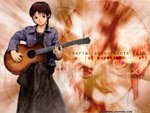 Japanese seem to have many formal phrases for certain actions. When visiting your superior or somebody for the first time, these phrases will be helpful to express your gratitude. Here are some common expressions you are likely to use when visiting Japanese homes.
Japanese seem to have many formal phrases for certain actions. When visiting your superior or somebody for the first time, these phrases will be helpful to express your gratitude. Here are some common expressions you are likely to use when visiting Japanese homes.At the Door
Guest:
- Konnichiwa.
こんにちは。
- Gomen kudasai.
ごめんください。
Host:
- Irasshai.
いらっしゃい。
- Irassaimase.
いらっしゃいませ。
- Yoku irasshai mashita.
よくいらっしゃいました。
- Youkoso.
ようこそ。
"Gomen kudasai" literally means, "Please forgive me for bothering you." It is often used when visiting someone's home. "Irassharu" is the honorific form (keigo) of the verb "kuru (to come)." All four expressions for a host mean "Welcome." "Irasshai" is less formal than other expressions. It should not be used when a guest is superior to a host.
When You Enter the Room
Host:
- Please come in.
Douzo oagari kudasai.
どうぞお上がりください。
Douzo ohairi kudasai.
どうぞお入りください。
- This way, please.
Douzo kochira e.
どうぞこちらへ。
Guest:
- Excuse me.
Ojama shimasu.
おじゃまします。
Shitsurei shimasu.
失礼します。
"Douzo" is very useful expression and means, "please." The Japanese use it quite often. "Douzo oagari kudasai" literally means, "Please come up." This is because Japanese houses usually have an elevated floor in the entrance (genkan) and step up to go into the house. Then, a well known tradition --- take off your shoes at the genkan. You might want to make sure your socks don't have any holes before visiting Japanese homes! A pair of slippers is often offered to wear in the house. When you enter a tatami (a straw mat) room, you should remove slippers.
"Ojama shimasu" literally means, "I'm going to get in your way" or " I will disturb you." It is used as a polite greeting when entering someone's home. "Shitsurei shimasu" literally means, "I'm going to be rude." This expression is used in various situations. When entering someone's house or room, it means "Excuse my interrupting." When leaving it is used as "Excuse my leaving" or "Good-bye."When Giving a Gift
- Here is something for you.
Tsumaranai mono desu ga ...
つまらないものですが…
- This is for you.
Kore douzo.
これどうぞ。
The Japanese customary bring a gift when visiting someone's home. The expression "Tsumaranai mono desu ga ..." is very Japanese. It literally means, "This is an trifling thing, but please accept it." It might sound strange to you. Why anyone brings such a thing as a gift? This is a humble expression. The humble form (kenjougo) is used when a speaker wants to lower his/her position. Therefore, this expression is often used to your superior, in spite of the true value of the gift. When giving a gift to your close friend or other informal occasions, "Kore douzo" will do it.
When Your Host Begins to Prepare Drinks or Food for You
- Please don't go to any trouble.
Douzo okamainaku.
どうぞお構いなく。
When Drinking or Eating
Host:
- Please help yourself.
Douzo meshiagatte kudasai.
どうぞ召し上がってください。
Guest:
- (Before Eating)
Itadakimasu.
いただきます。
- (After Eating)
Gochisousama deshita.
ごちそうさまでした。
"Meshiagaru" is the honorific form of the verb "taberu (to eat)." "Itadaku" is a humble form of the verb "morau (to receive)." However, "Itadakimasu" is a fixed expression used before eating or drinking. After eating "Gochisousama deshita" is used to express appreciation for the food. "Gochisou" literally means, "a feast." There is no religious significance of these phrases.
When Thinking about Leaving
- It is about time I should be leaving.
Sorosoro shitsurei shimasu.
そろそろ失礼します。
When Leaving Someone's Home
- Excuse me.
Ojama shimashita.
お邪魔しました。
"Ojama shimashita" literally means, "I got in the way." It is often used when leaving someone's home.








